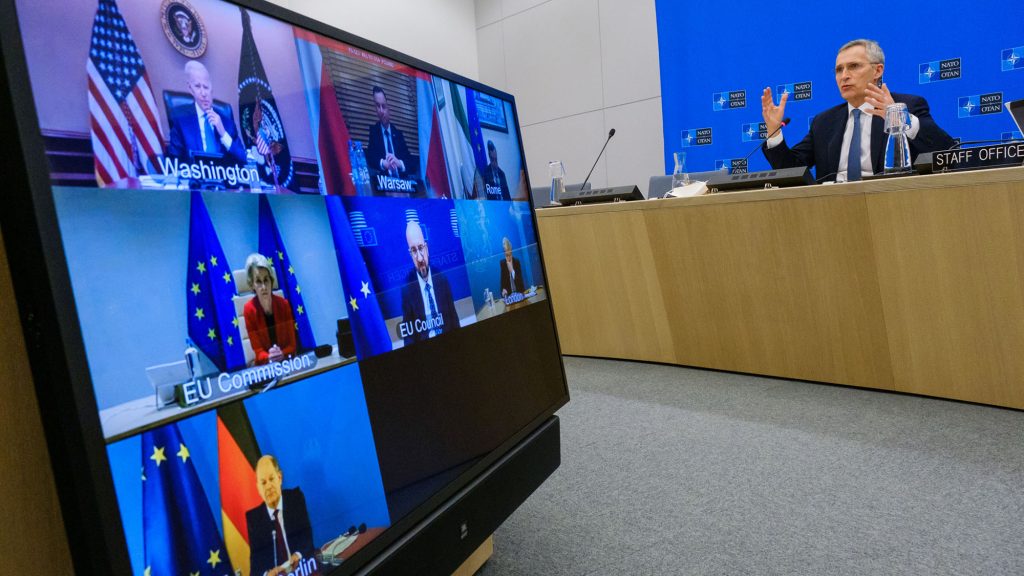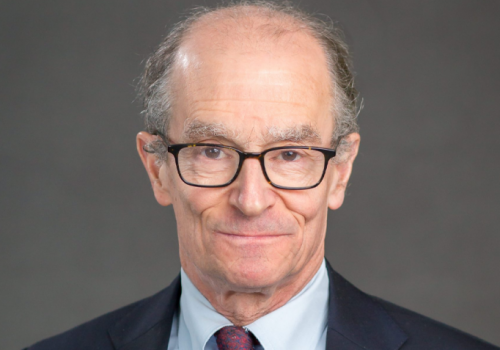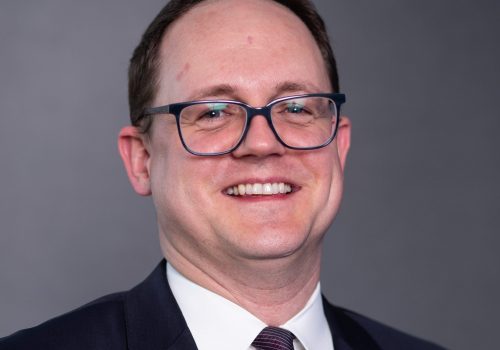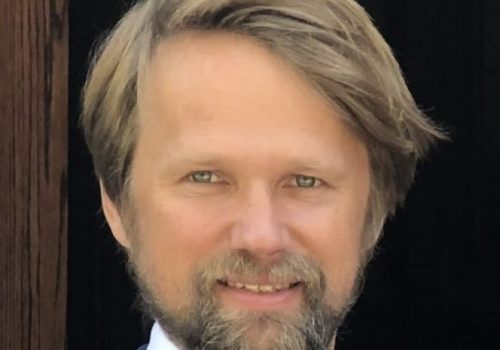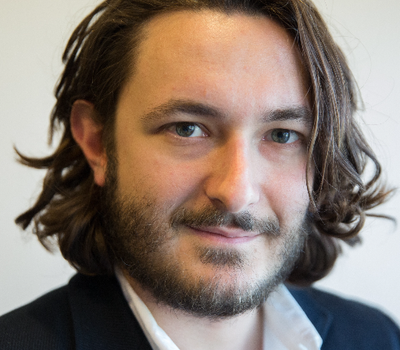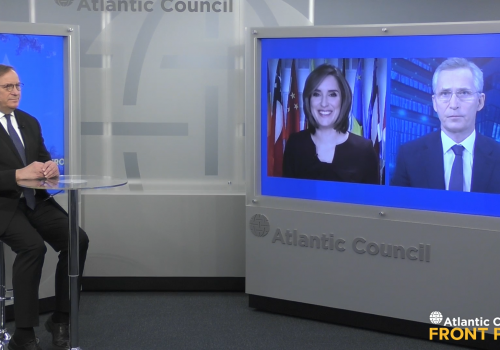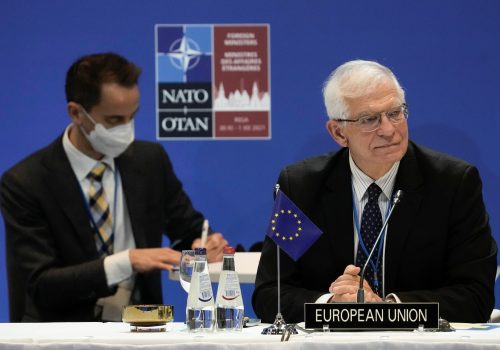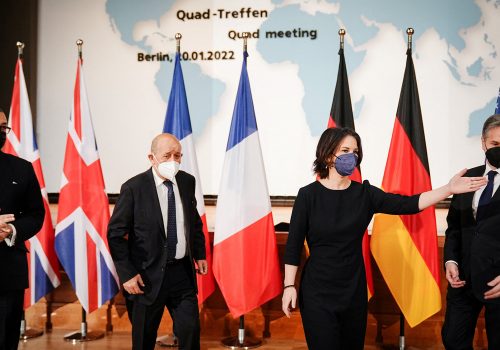This week the United States started to pivot away from trying to de-escalate the standoff with Russia over Ukraine, preparing instead to bolster NATO’s eastern flank by sending troops to exposed allies. Below, experts from the Atlantic Council’s Europe Center give their take on the rough consensus emerging in Europe and even across the Atlantic. How will this sea change play out across the continent? Which EU member states will rise to the challenge?
Click to read…
Washington: Finally off the back foot in this confrontation
The United States this week intensified the two tracks of its policy to prevent Russian President Vladimir Putin from destroying Ukraine’s independence through intimidation, war, or other measures short of war. It advanced preparations to send US troops to bolster the defenses of NATO’s eastern members, increased arms shipments to Ukraine (and was more vocal about it), and spoke more openly about the strong sanctions and export controls it would impose on Russia if it escalates its aggression against Ukraine.
At the same time, the United States intensified the diplomatic track by responding in writing to the Kremlin’s draft of a US-Russia treaty (and NATO did the same with respect to the Kremlin-drafted NATO-Russia treaty). This was fast work and even more impressive that the United States and NATO were able to coordinate their drafts and that the United States coordinated with Ukraine. The US response has not been made public but appears consistent with the US promise not to compromise on the principles at the foundation of an undivided Europe that emerged at the end of the Cold War. In its initial response to the US and NATO drafts, Russia complained that the United States had not addressed Russia’s major demands, but acknowledged in a grouchy fashion that some elements of the US response could be discussed.
The United States has begun to get off the back foot in this confrontation and has resumed its customary place of rallying the transatlantic community to deal with a developing threat. European views vary, as always, and some European governments (especially Germany) are visibly divided. But Europe has agreed to strong statements, both of its own and through NATO. The West may not be as divided as some fear—and as Putin hopes. The major tests are yet to come, however. Putin may yet start a general war with Ukraine.
—Daniel Fried is the Weiser Family distinguished fellow at the Atlantic Council.
NATO: Signs of a stronger, more capable, and more sovereign Europe
Although Ukraine is not a member of NATO and thus is not protected by the Alliance’s mutual-defense clause, the current crisis has expanded beyond Ukraine: Russia’s demands issued on December 17—that NATO withdraw forces from Eastern-flank states and promise that the Alliance stop expanding—have made that much clear. Over the course of this past week, the United States has adjusted its response to Russia’s belligerence, from working on de-escalating the situation to promising to move forces to exposed allies should Russia attack. The NATO Response Force was put on high alert. As a whole, NATO allies have shown a united front, not just in supporting Ukrainian sovereignty and in threatening Putin with severe consequences, but in showing solidarity with frontline NATO partners who feel most exposed should Russia’s blitz materialize.
Two important takeaways from the crisis thus far: First, NATO is a consensus-based organization, and there is sometimes a lag in building that consensus; once it is reached, however, it is a source of great strength. And second, there is less tension between the laudable goal of European strategic autonomy and NATO than critics often allege. In the solidarity on display, there are signs of a stronger, more capable, and more sovereign Europe emerging. This crisis is providing an object lesson in how allies can step up and take care of their own security—and illustrates just where they will need to bolster their effectiveness to ensure that they do not solely rely on the United States.
—Rachel Rizzo is a senior fellow at the Europe Center.
Germany: Too little, almost too late
A tumultuous few weeks seem to have nudged the new German government toward aligning with allies on a stronger deterrent stance. Should Russia escalate in Ukraine, German Foreign Minister Annalena Baerbock pledged on Thursday that the cancellation of the Nord Stream 2 pipeline would be among the measures on the table, alongside a panoply of severe sanctions. No talk of sending arms to Ukraine or of enhancing forward presence on the Eastern flank however—that’s still a bridge too far for this coalition. Germany’s coming around is too little, almost too late—and a real shame, as Germany had made some progress towards becoming a more responsible stakeholder in Europe, especially since Russia’s 2014 invasion of Crimea.
Foreign-policy officials and eventually even former German Chancellor Angela Merkel had come to understand that Russian revisionism had teeth. Berlin had started to tack away from a naïve view of Germany-Russia relations and toward a more hawkish stance. The last few weeks have undermined German credibility among allies and partners—from Kyiv to Tallinn, and from Warsaw to Washington. Some of the rhetoric directed at Berlin in recent days has been excessive, but it reveals real disappointments. The recent German pledge to supply five thousand helmets for Ukrainian troops betrayed a keen lack of understanding of where key allies are in preparing for the worst. Recent moves by the United States to increase the pressure on Russia and prepare for further escalation only accentuate how far behind the curve Berlin is. Rebuilding the trust squandered this January will require a step up in international engagement, as well as a concrete plan for Germany to support tougher measures should the crisis escalate further.
—Jörn Fleck is Deputy Director of the Europe Center.
France: Diplomacy, but with no illusions
The unprecedented coordination between the United States and Europe has produced remarkable unity when confronting Russia, offering Moscow two paths: one of diplomacy and one of deterrence. France’s own policy is part of this coherent collective-action approach. On the one hand, France is committed to pursuing active diplomatic routes: through close coordination with the United States in its bilateral stability dialogue with Russia, within NATO, within the Organization for Security and Co-operation in Europe, within the European Union (EU), and finally within the Normandy Format. The most recent Normandy talks were cause for cautious optimism, with a joint declaration signed by all the participants (the first time this has happened since 2019) signaling that diplomatic engagement is not to be cast aside.
While Russia’s true intentions remain unknowable, its declaration of support for the “unconditional observance of the cease-fire” in Ukraine is important. On the other hand, France, as the United States, intends to demonstrate that this diplomatic path is backed by firmness: Should Russia decide to go ahead with its so-called “technical-military” measures, such a move would be met with a strong response. France demonstrated its resolve through the threat of sanctions (at the EU level and in close coordination with allies) and the support of Ukraine through the EU, but also by displaying solidarity on the Eastern flank in strengthening NATO’s defense and deterrence. French policy remains balanced: It hopes diplomacy will win the day but has no illusions of what would follow should it not.
—Marie Jourdain is a visiting fellow at the Europe Center.
Central Europe: Weapons producers could change the game
The US shift towards a more hard-power approach in response to Russian threats to Ukraine has been warmly received by several allies in Central and Eastern Europe. Indeed, they have long called for it. Within the EU, it’s the Baltic countries and the Czech Republic that have so far approved sending weapons to Kyiv. In Poland, there are ongoing talks to do so. Former members of the Warsaw Pact can offer an added value here, as their warehouses often include materiel the Ukrainian military knows well and can use. Central and Eastern Europe also can be instrumental in training missions. Some observers claim Poland already has its trainers on the ground, alongside those from Britain and Canada. Moreover, arms support for Kyiv shouldn’t be only about short-term aid. Russia won’t stop intimidating Ukraine as long as it remains a democratic country—the real threat to the Kremlin, not NATO. If Kyiv can withstand Moscow’s political pressure, then it is in Europe’s interest to enhance Ukraine’s own arms-production capacities. Established ties with traditional Central European weapons producers could prove transformational.
Despite former Warsaw Pact members being the most exposed—not only to the direct impact of the potential Russian invasion but also to the Kremlin’s efforts to change the security order in Europe—it is not a given that a unified front will survive a Russian invasion fully intact. Sooner or later, discussions about national interests will likely reappear, boosted by Russian disinformation campaigns. The world has to prepare for such debates. Washington has done well in leading a strong response to Russian provocations, and it would do well if it publicly praised allies that have also been proactive. Others will take note.
—Petr Tůma is a visiting fellow at the Europe Center.
Northern Europe: The end of military non-alignment?
Tensions on NATO’s eastern flank have sparked readiness, solidarity, and debate in Northern Europe. Denmark has deployed four additional F-16s for NATO air policing in the Baltic region and a frigate to NATO’s standing naval force. Sweden, for its part, has steadily increased its military presence and preparedness on the island of Gotland since January 13. The island is strategically important for defending the Baltic Sea region but is also a potential soft spot in which Russia can directly pressure the West. Military cooperation with the United States and other allies such as Finland, and solidarity within the EU remain a fundamental part of Sweden’s defense strategy. Russia’s assertive actions, however, have raised the question of whether continued military non-alignment creates stability or vulnerability. Despite much public debate, both Sweden and Finland remain firm in their positions on military non-alignment and continuous diplomatic efforts to de-escalate tensions. Yet, as Swedish Foreign Minister Ann Linde said on national television, “this can still go completely to hell.” As a result, both Stockholm and Helsinki are intensifying consultations and coordination with NATO.
—Anna Wieslander is director for Northern Europe at the Europe Center.
Britain: No de-escalation here
Britain began this crisis with a clear aim: Be way out in front—and in so doing, stiffen Americans’ backs. London sent new troops early to the region, deploying the Royal Engineers to Poland in December to help guard against Belarusian leader Alyaksandr Lukashenka’s subterfuge. They turned out to be the advance guard of potentially thousands of NATO troops to reinforce the eastern flank. London was certainly the European player doing the heaviest lift when it came to last week’s arms delivery to Kyiv, helping open the door politically to further shipments from Britain’s allies, from the Baltics to the Netherlands. When it comes to intelligence, Britain was the loudest country warning of the threat of Russian-backed regime change in Kyiv.
In Parliament, it was possible to forget that Jeremy Corbyn, often deeply critical of NATO and more open to listening to Russia rather than deterring it, was ever the leader of the Labour Party: The opposition nodded heartily with Prime Minister Boris Johnson’s hints that he plans to send further troops eastward. London is not for de-escalation. Downing Street, at least when it comes to this, has every reason to feel pleased with itself as Paris and Washington announce their intentions for new deployments. But as the jokes in the House of Commons about eating too much cake showed, there wasn’t much for Johnson, a leader who much of his own party thinks is mortally wounded, to glory over. Johnson’s scandals are now holding Britain back. As the former head of the UK’s Secret Intelligence Service Sir John Sawers once explained to me, the moments that Britain has been best able to punch above its weight in the world have been when its system gathers around a strong prime minister like Margaret Thatcher or Tony Blair. Quite the opposite of this.
—Ben Judah is a senior fellow at the Europe Center.
Further reading
Fri, Jan 28, 2022
NATO chief on Russia crisis: We’re ready for anything
New Atlanticist By
NATO Secretary General Jens Stoltenberg believes the Alliance is fully prepared for the Kremlin's next move.
Sat, Jan 22, 2022
Experts react: Six options for Europe as it searches for a response to Russian aggression
New Atlanticist By
How can Europe hang together and maximize its impact? Our experts weigh in as the crisis over Ukraine heats up.
Thu, Jan 20, 2022
How Europe can reclaim its voice in the Russia crisis
New Atlanticist By
“There will be no peace in Europe if the States are reconstituted on the basis of national sovereignty.” This warning by Jean Monnet sums up the crisis Europe is currently experiencing nearly eighty years later.
Image: NATO Secretary General Jens Stoltenberg holds a virtual meeting with US President Joe Biden, British Prime Minister Boris Johnson, French President Emmanuel Macron, German Chancellor Olaf Scholz, Polish President Andrzej Duda, Italian Prime Minister Mario Draghi, President of the European Council Charles Michel and the President of the European Commission Ursula von der Leyen, on Tuesday Jan 25, 2022 over the situation of Russia's military actions on Ukraine. Photo via Reuters/Eyepress Media Limited
